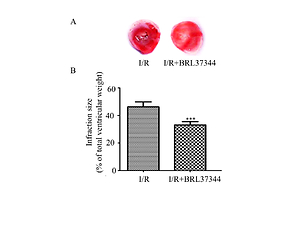Current issue
Archive
Manuscripts accepted
About the Journal
Editorial office
Editorial board
Section Editors
Abstracting and indexing
Subscription
Contact
Ethical standards and procedures
Most read articles
Instructions for authors
Article Processing Charge (APC)
Regulations of paying article processing charge (APC)
CARDIOLOGY / RESEARCH PAPER
The expression and role of β3AR protein in myocardial ischemia/reperfusion in rats
1
Department of Cardiology, QingPu Branch of Zhongshan Hospital Affiliated to Fudan
University, Shanghai, China
2
Department of Cardiology, Affiliated Hospital of XuZhou Medical University, Jiangsu
Province, China
Submission date: 2020-10-16
Final revision date: 2021-04-16
Acceptance date: 2021-04-18
Online publication date: 2021-04-23
Corresponding author
KEYWORDS
TOPICS
ABSTRACT
Introduction:
The aim of this study is to explore serum norepinephrine (NE) concentration and β3-adrenoceptor (β3AR) protein expression at different times during myocardial ischemia/reperfusion (I/R) in rats and to examine the role of β3AR in I/R.
Material and methods:
A total of 28 Sprague-Dawley (SD) rats were randomly divided into one sham group and six I/R groups (6 h, 12 h, 18 h, 24 h, 72 h, and 120 h). The rats in the I/R groups were subjected to ischemia for 45 min. After reperfusion, the serum NE concentration and the β3AR protein expression in the myocardial tissue of the left ventricular injury region were detected. Another 18 SD rats were randomly divided into a sham group, I/R groups, and an I/R + BRL37344 group. The myocardial infarct size (MIS) and the expression of apoptotic and anti-apoptotic proteins in the left ventricular myocardium of each group were measured.
Results:
Compared with the sham group, the serum NE concentration of rats in the I/R groups was significantly higher at 6 h (p < 0.001); the expression of myocardial β3AR protein started at 12 h. The serum NE concentration and myocardial β3AR protein expression were both highest at 72 h but remained high in the 120-hour group. Compared with the sham group, the expression levels of the pro-apoptotic proteins Bax and cleaved caspase-3 after I/R were significantly higher (p < 0.01, p < 0.001, respectively), and the expression of anti-apoptotic protein Bcl-2 was significantly lower (p < 0.01). Compared with I/R groups, the expression levels of Bax and cleaved caspase-3 in the I/R + BRL37344 group were significantly lower (p < 0.05, p < 0.01, respectively), and that of Bcl-2 was up-regulated (p < 0.05); MIS was significantly decreased (p < 0.001).
Conclusions:
With the prolongation of myocardial I/R in rats, serum NE concentration and β3AR protein expression showed a significant increasing trend and reached a peak at 72 h. Specific β3AR agonist BRL37344 can reduce myocardial I/R injury in vivo in rats, alleviate apoptosis, reduce infarct size, and improve cardiac function.
The aim of this study is to explore serum norepinephrine (NE) concentration and β3-adrenoceptor (β3AR) protein expression at different times during myocardial ischemia/reperfusion (I/R) in rats and to examine the role of β3AR in I/R.
Material and methods:
A total of 28 Sprague-Dawley (SD) rats were randomly divided into one sham group and six I/R groups (6 h, 12 h, 18 h, 24 h, 72 h, and 120 h). The rats in the I/R groups were subjected to ischemia for 45 min. After reperfusion, the serum NE concentration and the β3AR protein expression in the myocardial tissue of the left ventricular injury region were detected. Another 18 SD rats were randomly divided into a sham group, I/R groups, and an I/R + BRL37344 group. The myocardial infarct size (MIS) and the expression of apoptotic and anti-apoptotic proteins in the left ventricular myocardium of each group were measured.
Results:
Compared with the sham group, the serum NE concentration of rats in the I/R groups was significantly higher at 6 h (p < 0.001); the expression of myocardial β3AR protein started at 12 h. The serum NE concentration and myocardial β3AR protein expression were both highest at 72 h but remained high in the 120-hour group. Compared with the sham group, the expression levels of the pro-apoptotic proteins Bax and cleaved caspase-3 after I/R were significantly higher (p < 0.01, p < 0.001, respectively), and the expression of anti-apoptotic protein Bcl-2 was significantly lower (p < 0.01). Compared with I/R groups, the expression levels of Bax and cleaved caspase-3 in the I/R + BRL37344 group were significantly lower (p < 0.05, p < 0.01, respectively), and that of Bcl-2 was up-regulated (p < 0.05); MIS was significantly decreased (p < 0.001).
Conclusions:
With the prolongation of myocardial I/R in rats, serum NE concentration and β3AR protein expression showed a significant increasing trend and reached a peak at 72 h. Specific β3AR agonist BRL37344 can reduce myocardial I/R injury in vivo in rats, alleviate apoptosis, reduce infarct size, and improve cardiac function.
We process personal data collected when visiting the website. The function of obtaining information about users and their behavior is carried out by voluntarily entered information in forms and saving cookies in end devices. Data, including cookies, are used to provide services, improve the user experience and to analyze the traffic in accordance with the Privacy policy. Data are also collected and processed by Google Analytics tool (more).
You can change cookies settings in your browser. Restricted use of cookies in the browser configuration may affect some functionalities of the website.
You can change cookies settings in your browser. Restricted use of cookies in the browser configuration may affect some functionalities of the website.



